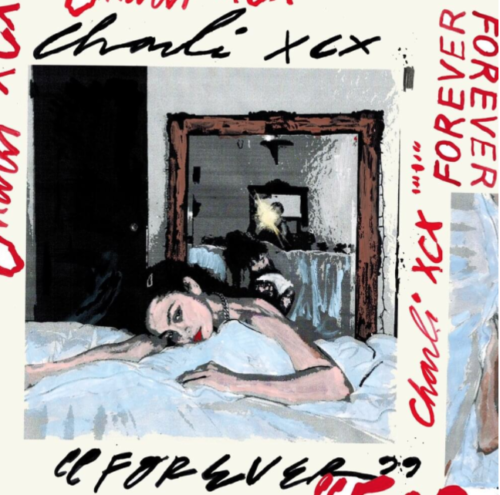As Charli XCX continues her democratic music-making process for an album called How I’m Feeling Now (to be released in mid-May), the British-turned-Angeleno chanteuse has taken her DIY approach while in quarantine to the music video for the first single, “Forever.” As part of the collaborative process with her fans, Charli compiled and edited roughly five thousand video clips sent in by the people she calls Angels (every pop star has to name their fan base, after all–except Madonna). And in so doing Charli shapes the narrative into an effortless contrast between how we lived only just a few months ago versus now, as the world has been collectively halted to a standstill (even China ain’t “one hundred percent” after being the first to go through the pandemic wringer).
The disparity is, of course, stark. And speaks to how life in the present has for so long prided itself on existing at an accelerated pace that a few months now somehow already feels like another lifetime–another era. And, in many ways, it was. One we don’t really know if we’ll ever be able to fully go back to. Even if we did, the taint–the PTSD–has already been inflicted. Although a lyrical homage to her boyfriend, Huck Kwong (who also serves as plenty of inspiration on her last record, Charli), the content also applies to a variety of relationships at the moment, whether romantic or platonic. For the song speaks to the distance between people not altering the love they still and always will have for one another. Hence the chorus: “I will always love you/I’ll love you forever/Even when we’re not together.” It’s a sentiment that reverberates throughout our social distancing/self-quarantining times. Except, in Charli’s case, missing her boyfriend on the regular was remedied when he threw up a peace sign to NYC in order to join her in LA for the collective shutdown.
And as they fell into their “quarantine routine” like the rest of us, the juxtaposition of normal life against the new normal showcases the way in which we’ve all learned to “live” as best as we can–mainly by finding distractions from the boredom (which is why, for some reason, Tiger King became everyone’s salvation for a brief period). From cleaning to reflecting on old memories and mementos, the barrage of clips serves as a reminder that, in many respects, we all deal with trauma in the same fashion (at least those who are not on the bottom rung of the socioeconomic ladder, for they are the ones who should actually be bitching).
The comparison between walking aimlessly through one’s house versus on the beach or somewhere else in nature is one of the most discombobulating edits, for it accents just how much we took such small things for granted. Of course, Americans (still) have the monopoly on freedom in their ability to muck about, for it is the Europeans who have been far stricter regarding the enforcement of lockdowns, requiring its denizens to fill out a piece of paper stating their purpose should they be caught outside by police without a viable reason.
XCX’s own sharp letting go of a curated aesthetic–a.k.a. the I-don’t-give-a-fuck-no-makeup look–compared to her more dolled up days (even including use of a “chic” diamond-y surgical mask–of the same genre as the one Billie Eilish wore to the Grammys) is another example of how the quarantine has put all of us in our places. Cut us down to size to make us admit we have fuck-all to do and fuck-all to impress. So who really gives a shit? Thus, the penchant for cutting one’s own hair/shaving one’s own head (a clip of which, yes, appears in the video). And, of course, what would quarantine imagery be without the presence of people’s pets, perhaps as fraught by all of this as humans themselves? For their space has been seemingly irrevocably infiltrated. Interspersed shots of outdoor activities suddenly improvised inside (skateboarding, ball throwing, etc.) further underscore the sad new reality, not even a dystopia–just a sadtopia. The outside world, indeed, is more consistently intercut with the inside of people’s homes/cells as the video progresses, reaching a fever pitch at the apex of the A.G. Cook-produced backbeat as a series of festivals comprise the footage that amounts to what will soon be viewed as a relic of the past, for it’s unlikely that concert-going will ever return to what it was.
The loneliness incurred by isolation is also encapsulated by images of people kissing themselves in the mirror, substituting real human contact as best as they can with the self-love that social media has taught them. A final montage of people lying around in a stupor in their apartments is followed by the last scene: someone running toward the ocean on the beach. It’s a hopeful note to conclude on, and Charli’s message is clear: that one day, things will be as they were. That we’ll see each other again. Except, the truth comes out more honestly in the lyric, “I know in the future/We won’t see each other.” As though a more accurate prophecy of the way we’ll keep continuing to live–at arm’s length and in constant fear of one another. For the deep-seated trauma is fairly ingrained at this juncture.
Even so, “Forever” at the very least serves as the type of time capsule one might bury in elementary school, only to dig up and realize you’ve been functioning just fine all this time without the contents inside. Even if, from a nostalgic, yearning point of view, the thought of the past and all its simplicity can still bring a tear to your eye. And then you shove the box aside again and remember how you live now.



















